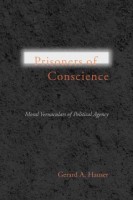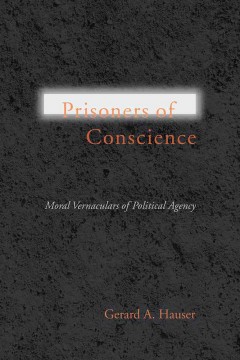 Author: Gerald A. Hauser
Author: Gerald A. Hauser
Series Editor: Thomas W. Benson – Studies in Rhetoric / Communication
Publisher: University of South Carolina Press – 283 pages
Book Review by: Paiso Jamakar
Five case studies of abuse of humans form the core of this eye-opening and enlightening book. These indignities took place twice in South Africa; and once each in Iraq, in Northern Ireland and in the Soviet Union.
Thomas W. Benson, the editor of a series of books in rhetoric and communication (which includes this book) published by the University of South Carolina Press, describes Prisoners of Conscience as a “work of erudition, scrupulous theoretical reasoning, patient critical analysis and profound moral seriousness.” I concur with those comments.
What is this book about? Let us read the words of the author himself. In his Preface, Gerald Hauser writes that Prisoners of Conscience “is concerned with vernacular discourse as a mode of rhetoric where the vernacular is the main source of available appeals: the discourse of political prisoners, or more precisely, prisoners of conscience (POCs).”
Hauser wrote an earlier book, in 1999, entitled Vernacular Voices: The Rhetoric of Publics and Spheres. He points out that the main thesis of that work was that we should pay more attention to the discourse of ordinary citizens, revealed in vernacular rhetoric, as a form of public opinion, than the polls and public statements of a country’s leaders and government officials.
The subject matter of this book is similar to the earlier one but different in that it provides cases of extreme human rights abuse. This book really got me, as I think it will get you, thinking in new ways about how the government misinforms the public, and how the major national media become participants in broadcasting that misinformation. As a result, the truth gets hidden from the public
The book shows us how the “modes of resistance” of prisoners of conscience constitute a new way of discourse on human rights. Such discourse – often occurring in vernacular or local language – are often much more revealing of the true feelings of people and of public opinion than the sanitized official statements coming through the mass media of communication.
“News” consisting of rehashing of statements in press releases by government spokesmen and agencies often hide the facts and the truth to protect the reputations of higher officials in government, Why not get the facts directly through the Internet to get at the real story not revealed by major national media? I ask. And why not ask the man on the street about his feelings on the issue at hand?
Hauser points out to the deceitful ways of leaders and government officials and their manipulation. He writes: “POCs engage in performances of moral suasion by resisting the deceits of states that would manipulate human weaknesses with false hope of freedom at the expense of personal integrity.”
He writes that prisoners of conscience are “engaged in unyielding combat with prison authorities to protect their lives.” He adds that they are constantly engaged in efforts to “keep the resistance movement alive.” Such ceaseless campaigns in the past have helped create international pressure against despotic leaders to grant freedom to the prisoners of conscience. The fact that POCs have been released from prison by authoritarian rulers and that human rights abuse has stopped is proof that agitation works.
Besides discussing in detail the five cases of human rights abuse in as many chapters in Part II of this book, this book also contains a chapter entitled The Moral Vernacular of Political Agency that is worth reading.
I also urge readers to gain further insight into what Gerald Hauser terms the “moral vernacular rhetoric of human rights” by reading the three chapters of Part I, namely:
- Reclaiming Voice
- Human Rights and Human Rights Talk
- Thick Moral Vernacular and Human Rights.
For those looking to delve deeper into the subject of human rights, a 20-page long list of books is provided in the Bibliography at the end of the book.
Gerald A. Hauser is a College Professor of Distinction in the Department of Communication at the University of Colorado in Boulder, Colorado. He is the author of two other books: Introduction to Rhetorical Theory and Vernacular Voices: The Rhetoric of Publics and Spheres.
He is a distinguished scholar of the national Communication Association and a fellow of the Rhetoric Society of America. He is also editor of the journal Philosophy and Rhetoric.







